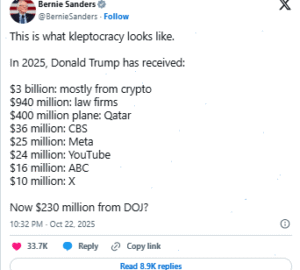Bernie Sanders Condemns Trump Over His 2025 Financial Windfall from Legal Settlements

Senator Bernie Sanders has taken aim at Donald Trump, blasting what he calls “a disturbing display of self-enrichment” after the former president reportedly collected hundreds of millions of dollars through a series of extraordinary legal settlements in 2025. Sanders’ remarks came amid growing public debate about the ethics of a sitting president benefiting financially from corporate lawsuits and government payouts, an issue that has reignited long-standing concerns about corruption, influence, and transparency in American politics.
Trump, who has long portrayed himself as a wealthy outsider immune to political corruption, often boasts about declining his $400,000 presidential salary during his time in office—a gesture he frames as evidence of selflessness and patriotism. While technically true that he has donated or redirected portions of his presidential pay, including his first check in his second term toward White House renovations, the broader picture of his finances this year paints a starkly different reality.
Far from sacrificing income, Trump’s legal maneuvering throughout 2025 has reportedly generated massive personal wealth, eclipsing any earnings from his presidential role. According to CBS News, the standard presidential compensation has remained unchanged for two decades and includes several perks: a $50,000 expense allowance, $100,000 for travel, and $19,000 for official entertainment. Trump has downplayed these benefits in public, but his legal pursuits outside the Oval Office have proven to be far more lucrative than the salary he often brags about rejecting.
Multi-Million Dollar Settlements with Tech Giants
One of Trump’s largest paydays of 2025 came from Meta Platforms, the parent company of Facebook and Instagram. The origins of this case date back to early 2021, when Trump’s accounts were permanently suspended in the wake of the January 6th Capitol riot. The bans were lifted in 2023, but Trump continued to pursue litigation, claiming the company had infringed on his freedom of speech and caused long-term reputational damage.
After two years of legal wrangling, Meta agreed to a $25 million settlement, reportedly one of the most expensive agreements of its kind. Of that total, $22 million is said to be earmarked for Trump’s planned presidential library, slated to open in January 2029—a move that many critics, including Sanders, have called “an extraordinary blending of public legacy and private profit.”
Just months later, YouTube followed with its own multimillion-dollar payout, settling for $24.5 million after a similar free-speech lawsuit. Trump’s legal team had accused YouTube of “unfairly silencing political discourse” when the platform suspended his channel in 2021. YouTube, citing risks of “potential incitement,” had defended its decision, but after years of litigation, the company opted for settlement rather than prolonged legal exposure.
Another social media giant, Twitter—now operating under the name X—also settled with Trump earlier in the year for $10 million. This case, stemming from his permanent 2021 suspension, underscored what Trump’s legal representatives described as “a pattern of coordinated digital censorship targeting a sitting president.”

Corporate Media and the Paramount Dispute
Trump’s streak of legal victories extended beyond Big Tech. In July 2025, the former president reached a $16 million settlement with Paramount Global, the parent company of CBS. The dispute originated from a controversial interview conducted by CBS with former Vice President Kamala Harris, in which Trump alleged he was misrepresented and defamed.
Senator Sanders later suggested that Trump’s total gain from CBS-related dealings may have been much higher—up to $36 million—once factoring in an additional $20 million in promised advertising and programming credits from Paramount’s incoming owner, David Ellison. Trump later confirmed the figure, explaining that the additional funds represented future production and promotional support for projects tied to his media brand and political outreach.
The Expanding Financial Picture
In a detailed post shared on his X (formerly Twitter) account, Senator Sanders summarized what he called “a staggering accumulation of wealth unprecedented for a sitting president.” His post listed Trump’s reported 2025 earnings as follows:
-
$3 billion from cryptocurrency holdings and sales
-
$940 million from law firm-related transactions
-
$400 million from aviation deals with Qatar
-
$36 million connected to CBS settlements
-
$25 million from Meta
-
$24 million from YouTube
-
$16 million from ABC
-
$10 million from X (Twitter)
-
$230 million in a potential Department of Justice settlement
The final line in Sanders’s list—the proposed $230 million DOJ settlement—has drawn the most controversy. According to reporting by The New York Times, Trump claims the Justice Department owes him this amount as compensation for what he describes as “unwarranted federal investigations and legal harassment” spanning multiple years. The proposal, which has reportedly been discussed by officials with prior connections to Trump’s administration, has raised profound ethical and constitutional concerns.
Critics argue that such a payout could amount to an abuse of power and would set a dangerous precedent for future presidents. “The idea that a sitting president could receive hundreds of millions from the very department tasked with overseeing the law is beyond comprehension,” Sanders said in a televised interview. “This is not governance—it’s kleptocracy, plain and simple.”

Trump’s Response
Trump, unsurprisingly, has dismissed the outrage. Speaking during a rally in Florida, he brushed off questions about his finances, saying, “I don’t know the numbers. I don’t even talk to the lawyers about that. They owe me money, sure, but it’s not about that. If I get it, I’d probably give it to charity—or maybe build something beautiful for America.”
His remarks did little to quiet critics. Many view Trump’s statements as an attempt to minimize public scrutiny, while others see them as consistent with his long-standing strategy of reframing controversies into demonstrations of strength and success.
Political analyst Dr. Elaine Porter of Georgetown University noted, “Trump’s approach is unique in modern political history. He has managed to turn legal conflicts into both financial assets and political theater. Every lawsuit becomes another opportunity to reinforce his narrative of persecution and triumph.”
The Ethical Debate
The magnitude of Trump’s 2025 settlements has reignited broader questions about conflict of interest and financial ethics in the presidency. While past presidents have faced scrutiny over private business dealings, none have profited so extensively through ongoing litigation while in office. Legal experts have pointed out that although there is no explicit law preventing a president from receiving settlement payouts, the situation underscores gaps in the nation’s system of financial accountability and transparency for elected officials.
Sanders, who has spent much of his career advocating for stricter ethics laws and corporate accountability, has used Trump’s example as a rallying cry for reform. “When a president can turn the presidency into a profit machine—when legal settlements, government payouts, and corporate deals flow directly into his pocket—democracy itself is at risk,” he said.
A Presidency Like No Other
Trump’s financial saga in 2025 illustrates a new, uncharted intersection between political power and private wealth. Supporters frame his legal victories as examples of resilience and strategic brilliance—proof, they argue, that Trump remains a master negotiator and a champion against “biased institutions.” Detractors, meanwhile, see them as symptoms of systemic corruption, evidence that Trump has blurred the line between public service and personal enrichment.
Either way, the year’s developments have solidified 2025 as a defining moment in American political history. For the first time, the legal system itself has become a source of enormous personal revenue for a sitting president. The implications stretch far beyond Trump, raising pressing questions about future leaders: Should presidents be allowed to pursue—and profit from—private litigation while in office? Where does accountability end and exploitation begin?
As the debate continues, one thing is undeniable — Donald Trump’s financial empire has grown larger than ever, not through business or policy, but through the courtroom. And as Sanders and other lawmakers push for transparency, the American public is left grappling with a difficult truth: that the boundaries between public duty and private gain have never been more blurred.